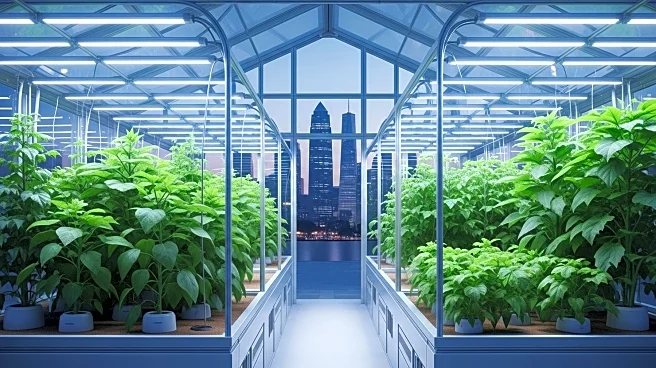What is the story about?
What's Happening?
The urban farming market in the United States is poised for significant growth, driven by innovative technologies and increasing urbanization. According to a report by DataM Intelligence, the market size reached $172.62 billion in 2024 and is projected to grow to $311.24 billion by 2032, with a compound annual growth rate (CAGR) of 7.6% from 2025 to 2032. Urban farming involves the cultivation of crops, vegetables, fruits, and livestock within city environments using techniques such as vertical farming, hydroponics, and rooftop gardens. Recent developments in the U.S. include the expansion of hydroponic lettuce operations in Chicago and the launch of AI-powered sensors for urban rooftop greenhouses in San Francisco. New York City has also announced a municipal grant program for community hydroponic gardens targeting underserved neighborhoods.
Why It's Important?
The growth of urban farming is significant for several reasons. It addresses the increasing demand for fresh, local produce and promotes sustainable agricultural practices. By optimizing limited urban space, urban farming enhances food security, reduces the carbon footprint, and supports environmentally friendly agriculture. This market expansion is likely to benefit urban communities by providing access to fresh produce and creating new economic opportunities. Key players in the market, such as AeroFarms and Sky Greens, are at the forefront of these innovations, which could lead to a transformation in how food is produced and consumed in urban areas.
What's Next?
As the urban farming market continues to grow, further technological advancements and investments are expected. Cities may increasingly adopt policies and programs to support urban agriculture, potentially leading to more community-based initiatives and public-private partnerships. The expansion of urban farming could also influence urban planning and development, integrating more green spaces and sustainable practices into city landscapes. Stakeholders, including policymakers, businesses, and community organizations, will likely play crucial roles in shaping the future of urban farming.
Beyond the Headlines
The rise of urban farming also presents ethical and cultural implications. It challenges traditional agricultural practices and could lead to shifts in consumer behavior towards more sustainable food choices. Additionally, urban farming may contribute to social equity by providing underserved communities with access to fresh produce and opportunities for economic empowerment. However, it also raises questions about land use, resource allocation, and the balance between urban development and green space preservation.
















